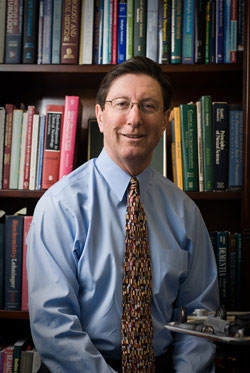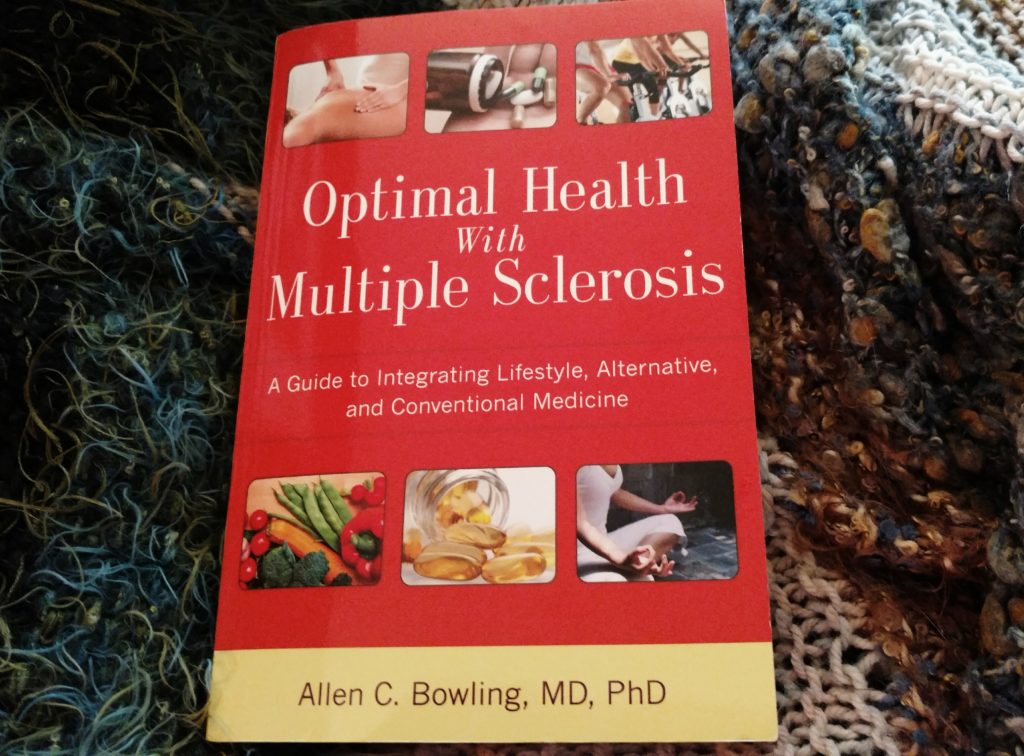How Can Integrative Medicine Make You Healthier?
When you live with an illness, any illness, you immediately look for ways to feel better. If you have a headache you take an aspirin. If you have high cholesterol you take a statin. But sometimes there aren’t simple solutions to alleviate your symptoms.
What do you do when you're desperate to step outside the box of conventional medicine to feel better?
One doctor in Colorado has been guiding patients to jump outside that box for years. His name is Dr. Allen Bowling and he's an internationally renowned neurologist and MS specialist.
He's also a leading authority on complementary and alternative medicine (CAM) as applied to Multiple Sclerosis.
Dr. Bowling entered my radar years ago when I was newly diagnosed and looking for ways to live healthier. The diets I found at the time fell short of what I was looking for. Roy Swank touted his extremely low in saturated fat diet and John McDougall offered a fad diet.
They weren’t for me.
I knew I didn’t want to rely solely on solumedrol (the only option at the time) whenever I had a flareup. I wondered if diet, exercise and a holistic health approach combined with traditional medicine would provide a healthier way of life.
Loyal readers know I became a follower of Dr. Andrew Weil's advice soon after my diagnosis. Weil is the (now) celebrity doctor who focuses on holistic health and integrative medicine. I clung to him in the beginning of my MS journey.
But I needed more answers. That's when I discovered Allen Bowling.
At the recent Consortium of Multiple Sclerosis Center's annual meeting I had an opportunity to attend a symposium focusing on lifestyle factors where Dr. Bowling presented his topic “Expanding the MS Toolkit: Integrating Lifestyle Factors and Unconventional Medicine Into MS Clinical Care.” It fascinated me.
It’s a subject Dr. Bowling is passionate about.Thank goodness for all of us.
Bowling’s newest book “Optimal Health with Multiple Sclerosis: A Guide to Integrating Lifestyle, Alternative, and Conventional Medicine” synthesizes his decades of important research, writing and caring about the MS community. I use it as a guide for healthy living.
For those living with MS - and even for those without - it's a reference book you can depend on time and time again. It is a bible for better health.
(NOTE: I love that one of my heroes, Dr. Oliver Sacks, highly recommended Dr. Bowling’s book. "This book is full of wise and balanced information. It provides a valuable service to patient and health care provider alike."--Dr. Oliver Sacks, author of Awakenings)
Dr. Bowling was kind enough to answer a few questions of interest for anyone searching for a healthier way of life. If you're looking for the key to mind, body and spirit working in harmony Dr. Bowling can help you open that door.
How did you first become interested in integrative medicine? When did you decide to share your interest with the MS community?
I first became interested in integrative medicine when I went into practice 20 years ago and realized that most of my patients were interested in this type of approach, yet I had received no education and training in this approach. Once I collected a small amount of evidence-based information in this area (a few months of work 20 years ago), I began writing and speaking on the topic. I also began to incorporate it into my clinical practice.
What was the first concept that caught your eye to learn more about integrative medicine?
What caught my eye about this approach (and was actually quite shocking!) is that this approach actually leads to a higher quality of care but it is not the standard of care. It provides a higher quality of care because it includes conventional medicine, addresses lifestyle factors that may prevent many diseases and may be beneficial for MS and many other conditions, and provides evidence-based information about “alternative” approaches.
Were you influenced by anyone’s work in integrative medicine to help you make the decision to go in that direction?
Early in my work, there were very few professionals who were truly using an evidence-based approach in this area—most of the information that was available was excessively negative or positive and did not include much evidence. In the 1990s, I was influenced by the work of Dr Edzard Ernst in the United Kingdom. My patients generally did not find either of these extreme, non-evidence-based approaches helpful—they wanted the “real deal” information without spin and without sugar-coating.
How do you explain integrative medicine to patients and why they’d benefit from incorporating it into their own lives?
I explain to patients that there is evidence that conventional MS medications have benefit for modifying MS disease course and treating MS symptoms, but there is also evidence that exercise, diet, emotional health, tobacco use, alcohol, and other medical conditions have important effects on MS and general health and therefore MUST be incorporated into the treatment plan.
In your experience does any one “type” of MS benefit more from integrative medicine than another?
I think all types of MS may benefit from this approach. In the specific case of progressive MS, for which many feel the treatment options are limited, I would argue that there are many therapies, especially integrative, that are available and should be used.
What has been the biggest game changer in the way patients view integrative medicine?
I think the biggest game changer is that people with MS and professionals are more open to this approach and also that more and more evidence is available to support the use of these approaches in a safe and effective manner.
What diet(s) do you suggest for the MS community?
I doubt there will ever be one best diet for MS—I think we may find one diet that’s the worst for MS…the standard American diet. For diet, I recommend:
- A generally healthy diet—in keeping with Michael Pollan’s quotation, “Eat food. Not too much. Mostly plants.” Specific diets that are consistent with this include DASH, MIND, TLC, Weight Watchers, and vegetarian.
- Consider Vitamin D and B12 supplements if blood levels of these nutrients are low.
- Avoid or cautiously use most supplements---there are more than 200 supplements that raise concern for people with MS.
- Limit calorie intake so as to maintain a healthy body weight.
How much exercise do you recommend to patients?
For exercise, I also think that it is unlikely we will ever find the one best program for people with MS. What I recommend is a personalized program that is enjoyable and generally has these features:
- 3-4 sessions per week with each session lasting 30-60 minutes.
- 2:1 ratio of aerobic:conditioning.
- Balance, stretching, and some type of relaxation during or at the end of exercise is fun!
- For people with any type of disability, the exercise program should be put together in conjunction with a physical therapist.
Please explain your integrative model in MS and the new paradigm in MS care.
The new paradigm of care that I discuss is this integrative model applied to MS. I discuss in detail in my recent book, Optimal Health with MS. This approach utilizes conventional medicine as well as unconventional medicine and lifestyle approaches to treat MS but also to treat other medical conditions and maintain whole body health. This approach has seven steps:
- Disease-modifying medication
- Symptomatic treatment—with conventional, unconventional, and lifestyle medicine
- Exercise
- Diet
- Personal and social well-being
- Tobacco and alcohol use
- Treatment and prevention of other medical conditions
What are your thoughts on medical marijuana for MS patients?
I think marijuana use needs to be thought through carefully for people with MS. As with any drug, one should weigh the risks and benefits of marijuana. There are multiple studies in MS that show that marijuana products may improve pain and one’s sense of muscle stiffness (spasticity). Unfortunately, the products that have been used in these studies are not available in the US—this leads to a challenge with relating these studies to day-to-day practice with products that are available in the US. Marijuana may interact with prescription medications and has possible adverse effects, such as addiction, motor vehicle accidents, dizziness, impaired balance.
Tell us what you’re currently working on.
My current focus is on how to truly use an integrative approach in day-to-day clinical care for those with MS. That is a large and complex task. As a clinician, this requires a true “mindshift” and a significant fund of knowledge and clinical experience. There is also a logistical challenge to provide this type of care within the confines of the US healthcare system.
Here's a bit more about Dr. Bowling’s book from the Yale School of Medicine's website:
When he returned to his native Colorado 20 years ago to treat people with multiple sclerosis, Allen C. Bowling, M.D. ’88, Ph.D. ’88, believed he was well prepared. After earning a medical degree and a doctorate in pharmacology at Yale, he completed his neurology residency at the University of California, San Francisco, and spent three years as a fellow at Harvard.
“I was thinking, ‘Wow! I have such a great toolbox for doing clinical practice at a high level.’ ” Before long, however, Bowling recognized gaps in his knowledge. “There’s so much I don’t know, so much I didn’t get, in more than a decade of training.”
This realization grew out of the nature of multiple sclerosis (MS): this disease of the central nervous system is incurable and unpredictable and causes a constellation of symptoms. Although his patients generally took conventional medications for MS, Bowling discovered that most were interested in how such lifestyle issues as diet and exercise affect the disease. More than half pursued strategies not dreamed of in the medical school curriculum: reflexology, removal of dental fillings, marijuana, magnets, pressurized oxygen, and prayer. However, at that time, there were not any reliable sources of MS-specific information in these areas.
“I realized that the quality of MS care could be improved by providing objective information about the safety and efficacy of these lifestyle and unconventional approaches to people with MS and also to health professionals.
Click here to read the rest of this article.
For more information on lifestyle and unconventional therapies take a look at Dr. Bowling’s website, Neurology Care.




